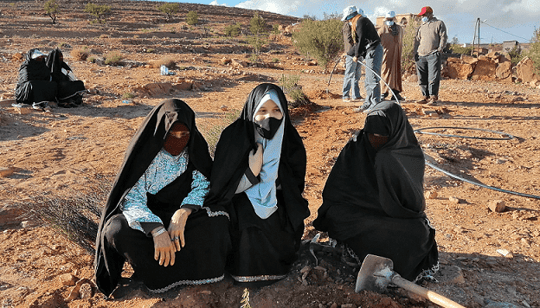Sustainable Agricultural Villages as a Panacea to Poverty

Sustainable Agricultural Villages As a Panacea to Poverty, By Olufunmilayo Aiyegbusi, moroccoworldnews.
By Olufunmilayo Aiyegbusi
Volunteer, High Atlas Foundation
Nigeria

As a nursing mother some years ago, I would have given anything to have had a small business. Working in a highly structured law firm and handling several sensitive case files clashed significantly with that phase of my life. There were immunization appointments to keep and calls from daycare because the baby had developed a fever. There were also pressing meetings with clients and numerous pleadings to be drafted. A small business of my own would have afforded me the flexibility that is often difficult to get from a structured workplace.
When my son was diagnosed with pneumonia, I promptly resigned. It broke my boss’ heart (as well as mine) so much so that he rejected my resignation letter and unilaterally converted it to a leave of absence in perpetuity. I was unimaginably broken while nursing my children and had to depend totally on my husband’s income.
It is common to listen to conversations about how women are not sufficiently represented in the corporate world due to systemic discrimination and exclusion. While this holds some truth, I consider it a one-sided view. The fact is that there is a phase in a woman’s life that is not well adapted to structured work. Every day of absence is costly for an employer of labour, and life in this system is not one where people are paid based on sentiment. This is the other side of the story that we need to tell.
The best business ideas are those that provide immediate solutions to the problems in a given community. According to a World Bank report, Poverty in Morocco: Challenges and Opportunities, Morocco has witnessed a significant decline in poverty. Despite this, it still faces high subjective poverty, especially in rural areas. The first indication of poverty is hunger, which derives from not having a reliable means of livelihood and mostly owing to a lack of different kinds of opportunities, such as in formal and informal education.
If I could have my own small business that employs one or two people who may have limited literacy, I would be solving two problems with one solution. First of all, I would have the flexibility to pace my work in such a way that it accommodates my domestic circumstances, and secondly, someone who otherwise did not have the necessary qualifications to be employed in the corporate labour market could have a satisfying means of livelihood.
Imagine having a space where people who have been denied education can also engage in valuable work and earn a living. What comes to mind is a Sustainable Agricultural Village, such as the Songhai model in Benin, composed of small businesses that attend to different aspects of the value chain: from planting to harvesting to sorting to processing and finally sales. This approach enhances specialization and provides better products at each phase.
Unlike the present situation with rural farmers wherein the same person plants, harvests, processes and sells, each small business owner can focus on a particular aspect of production. A small business owner may specialize in developing feed for animals. Most of what is needed to make up that feed can be procured within the Village i.e. plant waste. Another business owner may focus on preservation of fruits and vegetables sourced from the Village.
This sort of enterprise, though organized, is quite flexible because crops and animals do not require human presence all day — only intermittently. Also, the beauty of incorporating different aspects of the value chain is that they are all interdependent and therefore efficient in reducing costs. For example, droppings from the animals are useful as manure for plants and compost. Animal and plant waste can be made into biogas which can be used to power the equipment used for processing.
The flexibility and array of choices that this sort of enterprise affords is beneficial to women; particularly nursing mothers, uneducated women as well as uneducated men. It is also beneficial to the communities in which they are placed because access to fresh and steady supply of farm produce is more readily available. In this Village, the only education required can be gained through practical training on the job.
When considering agriculture however, water is of paramount importance. Morocco being a country with ranging topography from sand dunes to mountains and oases, it is particularly susceptible to drought and irregular rain patterns. These climatic conditions affect the availability of water for irrigation and drinking. The solution to this is the provision of water wells and the use of sprinklers. In addition, water-producing technology like Atmospheric Water Generators is useful in most of Morocco.
During the High Atlas Foundation’s (HAF) dedicated work implementing the USAID Farmer-to-Farmer Program in Morocco, the value of exchange among diverse agricultural practitioners has been made abundantly clear. Given Morocco’s accessible location, this Village could serve as a hub for experts and students from across the world to learn from one another and share vital experiences and information. The potential for this exchange of ideas, culture, and knowledge is notable — providing residents and visitors with a collective sense of purpose in working towards solutions, including gender empowerment through agriculture.
HAF focuses on the participatory approach where communities determine their own development. This concept of a Sustainable Agricultural Village is a summation of HAF’s work and can become a model to be replicated in other countries. A Village in Morocco, to be pursued with local and global partners, will go a long way in providing jobs that accommodate a wide range of lifestyles, a steady means of livelihood, and poverty alleviation for families.
Olufunmilayo Aiyegbusi is an attorney in Nigeria, a graduate student in international development at University of Groningen, and a Volunteer with the High Atlas Foundation.